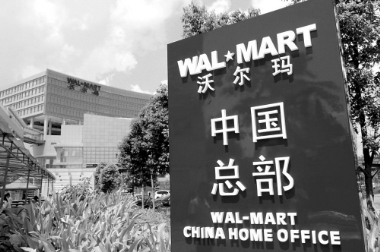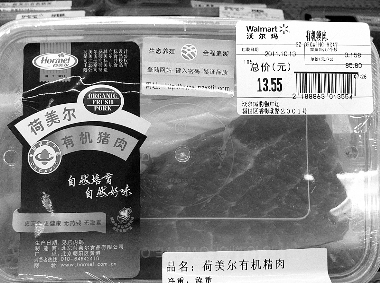|


Resignation not linked to store closures, detentions in Chongqing: spokesman
TWO executives of Walmart Stores Inc.’s China operation, including its head, have resigned for personal reasons, the company said yesterday, the latest setback for the world’s largest retailer in China where it has faced store closures and employee detentions.
The departures of Ed Chan, president and CEO of Walmart China, and senior vice president of human resources Clara Wong came a week after the company closed more than a dozen stores in Chongqing Municipality following allegations the stores sold regular pork which they claimed to be organic over the past two years.
Both resignations were for personal reasons and “have no correlation” with the investigations in Chongqing, Walmart Asia spokesman Anthony Rose said.
Authorities in Chongqing have arrested two Walmart China employees and detained 37 others over the incident.
“We have used the last few days to put in place corrective actions in our stores,” Rose said, adding that the stores will reopen by Oct. 25. He did not give details of the actions.
“It’s really hard to say whether the resignations are a consequence of that,” said Torsten Stocker, a China retail analyst with Monitor Group.
“It might be, but I think at the end of the day, it is still not clear what really happened in Chongqing,” he said. “Obviously what happened in Chongqing is impacting their business in the area and presumably ought to be having some impact on the grand overall business. Any type of leadership change like this, it’s never a good thing.”
The resignations at Walmart China marked the second departure of senior Walmart executives in China in less than five months. In May, chief financial officer Roland Lawrence and chief operating officer Rob Cissell resigned “to explore other opportunities,” the company said at the time.
Walmart also announced yesterday that effective immediately, Scott Price, president and CEO of Walmart Asia, will also serve as interim leader for Walmart China. Price will continue to serve both as the CEO of Walmart Asia and also as the CEO of Walmart China until a new CEO is named for Walmart’s China operations.
Price stressed in a statement yesterday that China is a strong market for the world’s largest retailer.
“We recently celebrated our 15th anniversary in China, and there is a lot to celebrate about our business here,” said Price.
“China is a very important market for Walmart and China’s 12th five-year plan will provide strong opportunities for the retail industry.”
Walmart competes with French hypermarket chain Carrefour, Britain’s Tesco, Germany’s Metro AG , China’s Sun Art and China Resources Enterprise in a hypermarket sector that is forecast to grow at a compounded annual rate of 10.1 percent between 2010 and 2015, according to Euromonitor.
After entering China in 1996, Walmart’s expansion gathered steam in 2007 when the world’s largest retailer bought a 35 percent stake in Taiwanese hypermarket chain Trust-Mart. It has 353 stores in 130 cities, and had created about 100,000 jobs across China, according to the company.
(SD-Agencies)
SZ Walmart pork ‘clear of mislabeling’
Jane Lai
WALMART Stores Inc., which is deeply embroiled in a scandal of mislabeling pork as organic in southwestern China’s Chongqing Municipality, said yesterday it had not found similar cases in its stores in the rest of China.
Authorities in Chongqing had detained at least 27 people, closed 13 Walmart stores for 15 days and fined the company 2.7 million yuan (US$421,000), media reported last week.
“Walmart attaches great importance to the incident,” Walmart China’s public relations manager Ryan Zheng said in an exclusive phone interview yesterday. It had looked at management procedures in its stores and would enhance management levels to ensure strict procedures and standards were maintained in all stores, he said.
The Walmart stores on Yannan Road, Zhenxing Road and Xiangmei Road in Futian District and on Shennan Boulevard in Nanshan District were selling farmed and organic pork. Organic lean pork was priced at 85.8 yuan per kilogram, almost double non-organic lean pork at 43.8 yuan. Organic loin chops were being sold for 69.8 yuan per kilogram over non-organic at 32 yuan.
“Our organic pork has been tested and certified by China Quality Mark Certification Group [one of the leading certification companies in the country] and it is different from that sold in Chongqing,” said Zeng Fanhua, a salesperson at Walmart’s Jingtian store in Futian District.
“Organic pork is certainly better and healthier than ordinary pork,” another employee surnamed Tu said. But when asked whether organic pork was more popular with customers, Tu said few people preferred organic pork and “I advise you to buy ordinary pork.”
According to industry insiders, supermarkets can make healthy profits from organic food because anything labeled “organic” was more expensive. Consumers had increasingly paid more attention to food additives and chemicals after several food scandals. Green and organic indicated safer and healthier.
So far, the government still lacks sufficient and effective supervision of the production and sale of organic food, as well as of the certification agencies, insiders say. That gave rise to small supermarkets and stores said to be using fake certificates to generate higher profits.
“It is very difficult to say whether the organic pork is organic and it is much more expensive, so my family usually buys [non-organic] pork,” a Cantonese woman surnamed Yao said last week in Walmart’s Yannan store.
Walmart has 17 stores, one Sam’s Club and two affiliates in Shenzhen.
|

